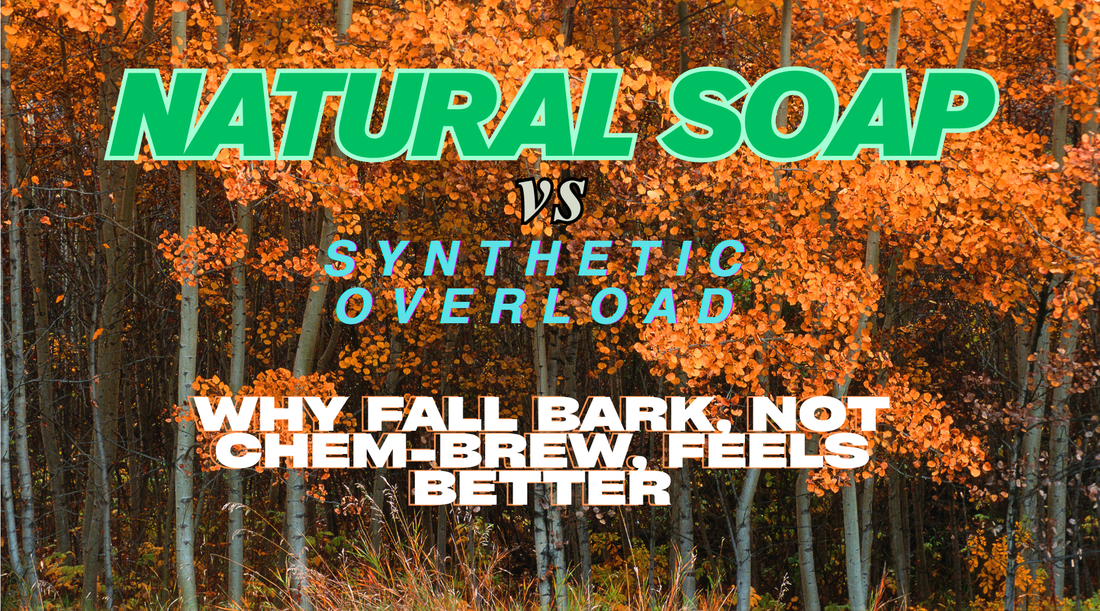
Natural Soap vs. Synthetic Overload: Why Fall Bark, Not Chem-Brew, Feels Better
Share
Fall Skincare Is All About Balance
As the air cools and the leaves start to turn, your skin feels it first. Fall means less humidity, more wind, and the start of dry indoor heating — all of which can leave skin parched, itchy, and irritated. It’s the season where the products you use make the difference between comfort and constant lotioning.
That’s where the debate really starts: natural bar soap vs. synthetic overload.
What’s Actually in a Synthetic Soap?
Pick up a mainstream body wash or “moisturizing” bar, and you’ll often see an ingredient panel that looks more like a chemistry set than skincare: sodium lauryl sulfate, triclosan, artificial dyes, and the catch-all “fragrance.”
Each of these has a job — foaming, thickening, scenting — but together they can be rough on skin, especially in colder months when the skin barrier is already vulnerable. Dermatologists consistently warn that artificial fragrance and strong detergents are among the top irritants for people with sensitive conditions like eczema or psoriasis.
Why “Fragrance” Isn’t Really an Answer
The biggest loophole in cosmetic labeling is that one little word: fragrance. The FDA allows companies to lump dozens — even hundreds — of scent chemicals into that single line item. The problem is simple: when you see “fragrance,” you don’t know what’s in it, and neither do we.
It could be plant-derived. It could be petroleum-derived. It could be both. The point is, as a customer, you’re left in the dark. For anyone with sensitive skin, that’s a gamble you don’t need to take.
Natural Soap Brings Ingredients You Can Trust
By contrast, a handmade bar of natural soap keeps it simple. Olive oil, coconut oil, shea butter, clays, botanicals, and essential oils — ingredients you can pronounce, understand, and trace back to nature.
For example, at Wild Timber, our Emerald Bay Pine bar lists only pine essential oil and black spruce essential oil for scent. Our Birch Breeze bar? Just birch essential oil. That’s it. No vague catch-alls, no hidden additives.
When you can read the ingredients line by line, you get confidence — and your skin gets relief.
Why Fall Demands Gentle, Real Soap
Fall is the season when many people reach for heavy creams to compensate for dry, itchy skin. But here’s the truth: if you’re using a synthetic soap loaded with fragrance and sulfates, you’re working against yourself. Every wash strips away the natural oils your skin desperately needs in drier weather.
Switching to real, handmade soap is like switching from junk food to whole foods. Your skin recognizes the difference. The natural fats in handcrafted soap help support your skin barrier instead of breaking it down. The essential oils give you a clean, woodsy scent without chemical overload.
Beyond Skin — It’s About Values
Using natural soap isn’t just about avoiding irritation. It’s about choosing transparency over loopholes, quality over quantity, and local craftsmanship over faceless production.
Wild Timber bars are handmade in St. Louis, inspired by real outdoor places, and built for men who want straightforward skincare without compromises. We don’t cut corners, and we don’t hide behind words like “fragrance.”
The Bottom Line
This fall, you’ll see ads everywhere pushing body washes with “moisturizing technology” or “natural fragrance blends.” But behind the slogans are the same old synthetic cocktails.
Your skin deserves better. Real soap, made with natural oils and essential oils, gives you everything you need — and nothing you don’t.
So when the air gets crisp and your skin starts to tighten, choose bark over chem-brew. Choose handmade over mass-made. Choose soap that respects your skin as much as you do.
🍂 Ready to make the switch this fall?
Bundle your favorites — Choose 5 for $32 — and join Trailhead Rewards to earn Timber Tokens with every bar.


